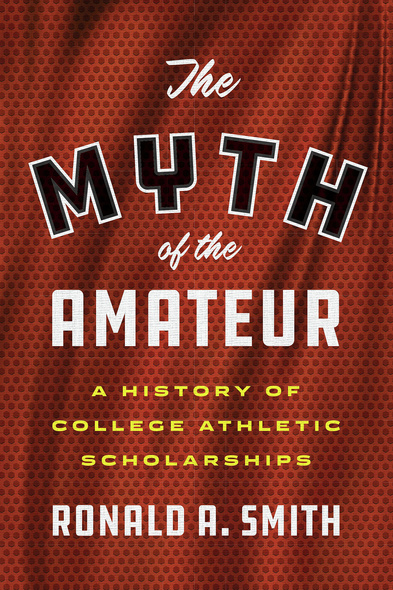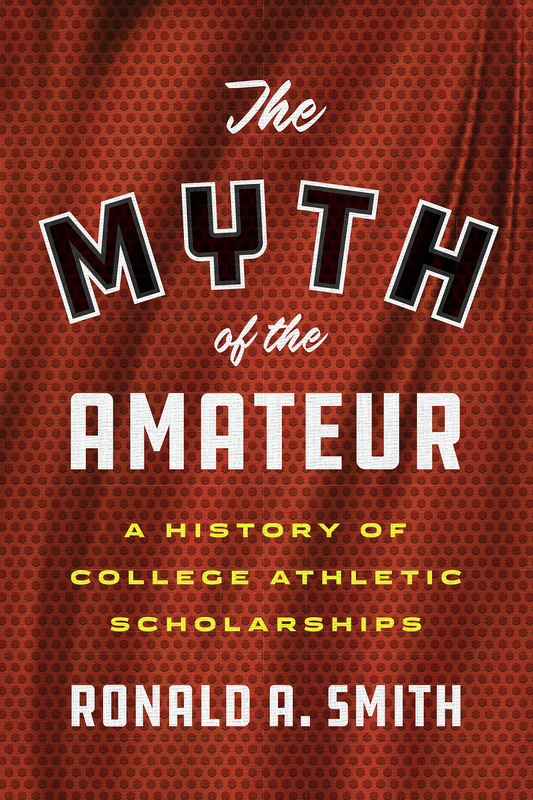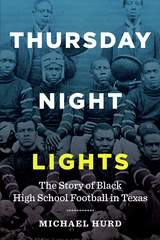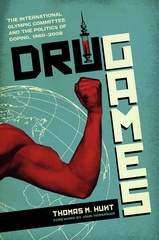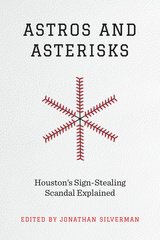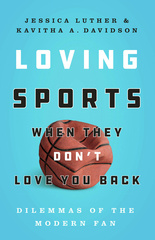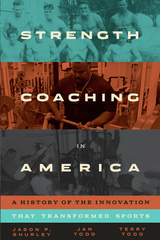The Myth of the Amateur
A History of College Athletic Scholarships
In this in-depth look at the heated debates over paying college athletes, Ronald A. Smith starts at the beginning: the first intercollegiate athletics competition—a crew regatta between Harvard and Yale—in 1852, when both teams received an all-expenses-paid vacation from a railroad magnate. This striking opening sets Smith on the path of a story filled with paradoxes and hypocrisies that plays out on the field, in meeting rooms, and in courtrooms—and that ultimately reveals that any insistence on amateurism is invalid, because these athletes have always been paid, one way or another.
From that first contest to athletes’ attempts to unionize and California’s 2019 Fair Pay to Play Act, Smith shows that, throughout the decades, undercover payments, hiring professional coaches, and breaking the NCAA’s rules on athletic scholarships have always been part of the game. He explores how the regulation of male and female student-athletes has shifted; how class, race, and gender played a role in these transitions; and how the case for amateurism evolved from a moral argument to one concerned with financially and legally protecting college sports and the NCAA. Timely and thought-provoking, The Myth of the Amateur is essential reading for college sports fans and scholars.
The research [in The Myth of the Amateur] reveals a mind that has been exploring this subject for a long time. By the time he gets to more contemporary matters, such as college athletes’ battle to be compensated for use of their likenesses, the author has covered an impressive stretch of time and topics. A long, winding road of sport and money supported by thorough research.
Rarely is a book published that so comprehensively documents, clearly explains, and coincides perfectly with the very latest state of affairs within a particular American institution. Fortunately for readers, this book is one of them...While certainly contributing an exhaustive historico-philosophical treatise of college sport and its administration for over 150 years, Smith's offering is so much more: a well-told tale of the long and enduring struggle between labor and management. Recent court rulings regarding compensation of college athletes for their names, images, and likenesses wonderfully incorporate, illustrate, and reinforce the author's arguments, and perhaps signal labor's victory over management—at least for now. This is a must-read text for sociologists, historians, philosophers, and labor studies scholars who focus on the institution of sport.
A definitive look at American colleges’ fraught history of paying athletes to play sports...In bringing the narrative up to the present, Smith amply documents the hypocrisy in the insistence that college players should be considered amateurs, and that academic standards were not compromised to accommodate sports...Smith’s exhaustive research paints a disturbing picture of entrenched corrupt practices. Those interested in both education and sports will be enlightened, if dismayed.
Smith provides a comprehensive history of how college athletes have been compensated, the different forms of that compensation, and the role amateurism has played in the legislating of compensation...this book provides a good chronicle of the history of college athletics in the United States and specifically the cyclical nature of college athletics administrators’ attempts at fitting various forms of amateurism into what has always been a commercial enterprise...The Myth of the Amateur can serve as a great resource for both undergraduate or graduate courses on intercollegiate athletics, sport in society, or sport history.
It is difficult to imagine how one could read this book and still believe that amateurism is a coherent, ethical, or practical idea today...For those interested in the ongoing debate about paying college athletes and how the ideas about amateurism in the United States have evolved over the last century and a half, one could hardly find a better book to read than the Myth of an Amateur.
Smith exhibits mastery of the wonderful heritage and rich hypocrisy associated with the history of college sports...Smith is a preeminent historian of American college sports, and The Myth of the Amateur should be an immediate read for any serious study of the topic.
This book is a skillful compendium of college athletics' hypocrisies and exploitative behaviors, particularly useful for sports historians and those interested in athlete rights...Smith proves that amateurism never really existed—and that only by changing the term's definition could the NCAA cling to any vague ideal along those lines. In doing so, he provides a more realistic understanding of college sports' history that will enable a better engagement with the present and the future.
The Myth of the Amateur offers a detailed, provocative, forceful, and timely reminder that the debates that swirl around the ideals and conduct of college athletics today have an important history.
In this book, Ronald A. Smith convincingly argues that those affiliated with the leadership of college sports have insisted for more than a hundred years, with an increasing amount of mental gymnastics, willful blindness, and, in some instances, outright lies, that such sports are amateur and must remain so to retain their essential meaning, appeal, and educational value. Grounded in an unassailable trove of archival evidence and secondary material, The Myth of the Amateur should do away, once and for all, with the charade that college athletes and the sports they play somehow need to be protected from the market.
Too many Americans think collegiate sports are for amateurs only, or that professionalism is a recent phenomenon. Yet Ronald A. Smith, who has researched this topic for decades and knows the history of US intercollegiate athletics better than anyone else, exposes the stark reality that athletic purity was never truly the case. He takes readers on a fascinating tour ranging from Harvard’s nineteenth-century training tables for rowers to the NCAA’s invention of the term 'student-athlete' in the 1950s; from the Kellmeyer case that cleared the way for women’s athletic scholarships in the Title IX era to the O’Bannon case that challenged the NCAA’s usage of non-compensated images of athletes. Anyone who cares about the past and future of college sports should read this book.
The Myth of the Amateur is an essential contribution to our understanding of the long and tortured history of the NCAA’s efforts to permit its member schools to avoid compensating their athletes through a wage-fixing cartel, while permitting Division I basketball and football schools to reap the ever-increasing amounts of revenue generated by those athletes. Ronald A. Smith carefully documents these efforts, as well as the increasing public and judicial awareness of the fact that the NCAA, like the famous emperor before, ‘has no clothes’ when it seeks to hide behind the facade of ‘amateurism’ to disguise its exploitation of these athletes, who are required to put their teams before their studies. As the public and judicial debate over the future of the NCAA rules continues, this is must reading for all those concerned about the fair and just treatment of the players who make these college sports so popular and profitable through the sweat of their labors and their extraordinary athletic skills.
Ronald A. Smith is a professor emeritus at Penn State University. His books include Sports and Freedom: The Rise of Big-Time College Athletics, Pay for Play: A History of Big-Time College Athletic Reform, and Wounded Lions: Joe Paterno, Jerry Sandusky, and the Crises in Penn State Athletics.
Chapter 1. Amateurism Then and Now
Chapter 2. The Harvard Dilemma—Amateur or Professional
Chapter 3. “Scholarships”: Eastern Authority and Early Payments
Chapter 4. Training, Training Tables, and Athletic Dorms
Chapter 5. The Amateur Challenge of Summer Baseball for Pay
Chapter 6. The 1929 Carnegie Report: Condemnation of Professionalism
Chapter 7. The Southeastern Conference and Athletic Scholarships
Chapter 8. National Athletic Scholarship Failure: The Sanity Code
Chapter 9. The Cleansing of the Ivy League: No Athletic Scholarships?
Chapter 10. Recruiting, Full Scholarships, and the Big Ten Succumbs
Chapter 11. Academic Standards, the 1.600 Rule, and Their Demise
Chapter 12. Taxation, Workers’ Compensation, and the “Student-Athlete”
Chapter 13. Women’s Athletics, Title IX, and the Kellmeyer Lawsuit
Chapter 14. Television, Unions, and the Collapse of Amateurism
Chapter 15. Is NCAA “Amateurism” Alive?: The O’Bannon Lawsuit Impact
Chapter 16. The Alston and Jenkins Lawsuits, and NCAA Fig-Leafed Professionalism
Chapter 17. State and Federal Legislative Pay-for-Play Action
Afterword
Acknowledgments
Timeline
Notes
Index

